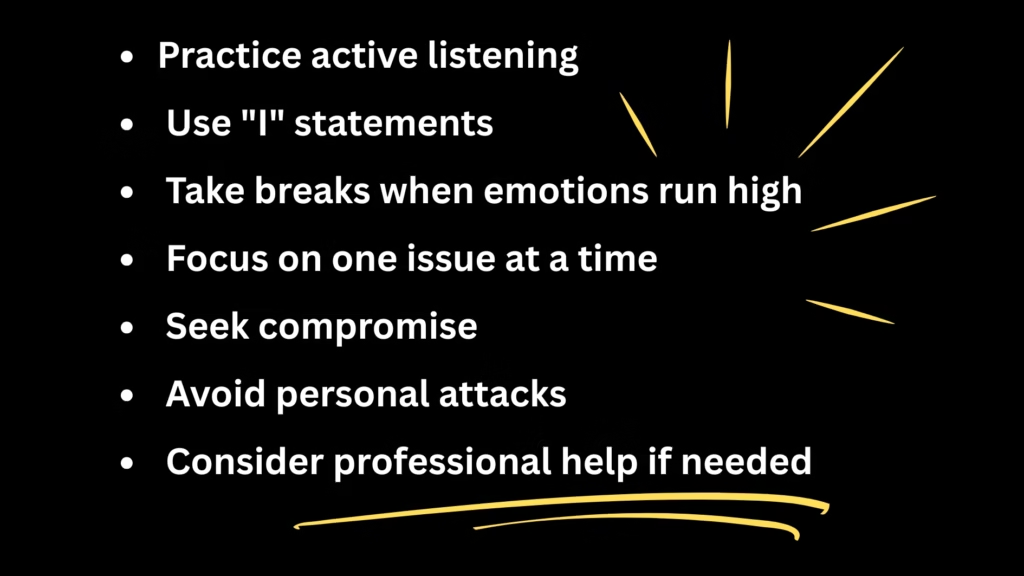Conflict resolution in relationships is not just about avoiding fights—it’s about learning to navigate disagreements in ways that deepen understanding, build trust, and foster long-term connection. Whether you’re newly in love or decades into a partnership, mastering conflict resolution in relationships can transform tension into growth.

In this guide, we’ll explore seven proven strategies to handle disagreements constructively. Backed by research, real-life case studies, and expert insights, these techniques will help you strengthen your bond through healthy conflict.
Why Conflict Is Inevitable—and Valuable
Every couple argues. But it’s not the presence of conflict that determines the health of a relationship—it’s how you handle it. According to a study of 1,112 long-term couples, the most effective conflict resolution strategies include listening, avoiding confrontation, and communicating well.
Psychotherapist Esther Perel emphasizes that conflict, when managed constructively, can lead to deeper intimacy and understanding between partners.
7 Proven Strategies for Conflict Resolution in Relationships
1. Practice Active Listening
Active listening involves fully concentrating on your partner’s words, acknowledging their feelings, and responding thoughtfully. This technique fosters empathy and reduces misunderstandings.
Example: Instead of interrupting, wait for your partner to finish speaking, then paraphrase their message to ensure understanding.
2. Use “I” Statements
Expressing your feelings using “I” statements prevents blame and encourages open dialogue.
Example: Say, “I feel hurt when plans change unexpectedly,” instead of, “You always change plans without telling me.”
3. Take a Break When Needed
If emotions escalate, it’s okay to pause the conversation. Agree on a time to revisit the discussion when both parties are calmer.
Example: “Let’s take a 15-minute break and then continue our conversation.”
4. Focus on the Issue at Hand
Avoid bringing up past grievances during a current disagreement. Stick to the present issue to prevent overwhelming the conversation.
Example: If discussing household chores, don’t bring up unrelated past arguments.
5. Seek Compromise
Aim for solutions that satisfy both partners. Compromise demonstrates mutual respect and willingness to adapt.
Example: If one partner prefers dining out and the other prefers cooking at home, agree to alternate between the two.
6. Avoid Personal Attacks
Criticizing your partner’s character can damage trust. Focus on behaviors, not personal traits.
Example: Instead of saying, “You’re lazy,” say, “I noticed the dishes weren’t done; can we discuss how to divide chores?”
7. Seek Professional Help When Needed
If conflicts persist, consider couples therapy. A professional can provide tools and guidance to navigate challenges.
Example: Therapists like John and Julie Gottman offer evidence-based approaches to strengthen relationships.
Consider a couple, Alex and Jamie, who frequently argued about spending habits. By implementing active listening and “I” statements, they began to understand each other’s perspectives. They also sought guidance from a financial advisor to create a budget that satisfied both. Over time, their financial disagreements decreased, and their relationship strengthened.
Expert Insight: The Role of Empathy in Conflict Resolution
Empathic accuracy—the ability to understand a partner’s thoughts and feelings—is crucial in resolving conflicts. Research indicates that higher empathic accuracy leads to better support and reduced aggression in relationships.
Comparison Table: Destructive vs. Constructive Conflict Behaviors
| Destructive Behaviors | Constructive Behaviors |
|---|---|
| Yelling or name-calling | Speaking calmly |
| Interrupting | Active listening |
| Blaming | Using “I” statements |
| Bringing up past issues | Focusing on the current issue |
| Avoiding the problem | Addressing issues directly |
Conflict Resolution Checklist
Conclusion: Turning Conflict into Connection
Conflict is a natural part of any relationship. By approaching disagreements with empathy, respect, and effective communication strategies, couples can transform conflicts into opportunities for growth and deeper connection.
Special Advice for Readers
Remember, it’s not about winning an argument; it’s about understanding your partner and finding common ground. Implementing these strategies requires practice and patience, but the rewards—a stronger, more resilient relationship—are well worth the effort.
Call to Action
Ready to strengthen your relationship through healthy conflict resolution? Start by practicing active listening in your next conversation. For more insights and tools, explore resources from experts like Esther Perel and the Gottman Institute.
FAQs : Conflict Resolution in Relationships
1. What is conflict resolution in relationships?
Conflict resolution involves addressing disagreements in a way that is constructive, respectful, and aimed at understanding and resolving issues without harming the relationship.
2. Why is conflict resolution important in a relationship?
Effective conflict resolution strengthens trust, improves communication, and prevents resentment from building up, leading to a healthier relationship.
3. How can I improve my conflict resolution skills?
Practice active listening, use “I” statements, stay calm, focus on the issue at hand, and seek compromise. Consider professional guidance if needed. SELFeCampus Ontario Pressbooks
4. What are common mistakes in handling conflicts?
Common mistakes include yelling, blaming, bringing up past issues, and avoiding the problem. These behaviors can escalate conflicts and damage the relationship.
5. Can conflict resolution strategies vary across cultures?
Yes, cultural backgrounds can influence communication styles and conflict resolution approaches. It’s important to be aware of and respect cultural differences in relationships.
6. Is it normal to have frequent conflicts in a relationship?
While occasional conflicts are normal, frequent and unresolved disputes may indicate underlying issues that need to be addressed, possibly with professional help.
7. How does empathy affect conflict resolution?
Empathy allows partners to understand each other’s perspectives and emotions, facilitating more compassionate and effective conflict resolution.
8. What role does communication play in conflict resolution?
Clear, honest, and respectful communication is essential in resolving conflicts and maintaining a healthy relationship.
9. When should couples seek professional help for conflicts?
If conflicts are frequent, intense, or lead to emotional or physical harm, seeking professional help from a therapist or counselor is advisable.
10. Can conflict resolution improve overall relationship satisfaction?
Yes, effectively resolving conflicts can lead to increased trust, intimacy, and satisfaction in a relationship.
Useful Articles :-
- Signs of Love Bombing: 7 Red Flags to Spot Manipulative Affection Early
- What Is a Situationship? 7 Unfiltered Truths About Modern Love
- 10 Signs of a Healthy Relationship: What To Look For
- Communication Skills for Couples: 7 Transformative Tips to Strengthen Your Connection
- 7 Powerful Ways to Build Healthy Relationship Boundaries for Lasting Love
- 9 Empowering Steps for Recovering from a Breakup: Heal, Grow, and Thrive
- 7 Powerful Long-Distance Relationship Advice : Tips to Keep the Spark Alive
- Jealousy in Relationships: 7 Powerful Ways to Manage the Green-Eyed Monster
- 5 Insights Into Love Languages in Relationships : Do They Really Work?
- What Does Emotional Safety In Relationships? 7 Biblical Keys to Building Trust and Intimacy